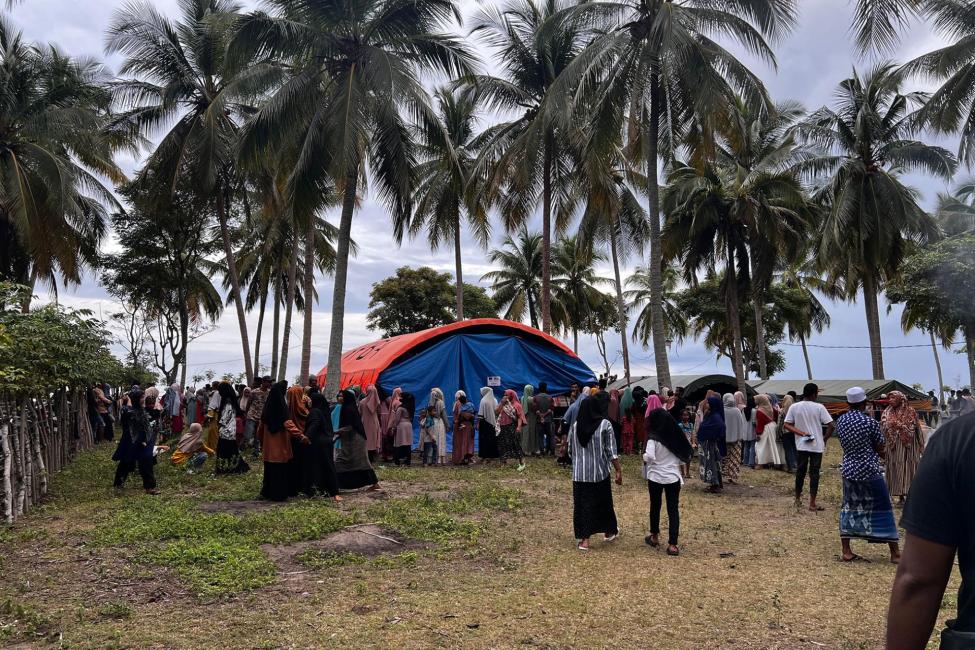-
Who we are
WHO WE AREThe International Organization for Migration (IOM) is part of the United Nations System as the leading inter-governmental organization promoting since 1951 humane and orderly migration for the benefit of all, with 175 member states and a presence in over 100 countries. IOM joined the United Nations system in September 2016.
About
About
IOM Global
IOM Global
-
Our Work
Our WorkAs the leading inter-governmental organization promoting humane and orderly migration, IOM plays a key role to support the achievement of the 2030 Agenda through different areas of intervention that connect both humanitarian assistance and sustainable development.
Cross-cutting (Global)
Cross-cutting (Global)
- Data and Resources
- Take Action
- 2030 Agenda
Human Mobility Partners Call for Concrete Action to Address Displacement and Loss and Damage Associated with Climate Change
Geneva – The International Organization for Migration (IOM), members and representatives of the United Nations Framework Convention on Climate Change (UNFCCC) Task Force on Displacement (TFD) and partners, and other relevant stakeholders, is calling for concrete action to avert, minimize and address displacement related to the adverse impacts of climate change and to integrate it in the institutional framework on loss and damage being created at the UN Climate Change Conference (COP28) in Dubai in November.
The latest Synthesis Report by the Intergovernmental Panel on Climate Change highlights that climate and weather extremes are increasingly driving displacement across all regions. According to the Internal Displacement Monitoring Centre, disasters led to 32.6 million internal displacements in 2022, the highest ever recorded. Large-scale displacements have devastating effects on people, creating complex challenges that call for urgent partnerships and action.
“No one should be displaced, but those who are need to be safe, empowered and informed to make decisions about their mobility,” said Manuel Marques Pereira, head of the IOM Migration, Environment, Climate Change and Risk Reduction (MECR) Division.
“IOM as the humanitarian co-lead of displacement management in disasters sees as a priority the support to countries and communities to establish a strong capacity to avert, minimize, and address displacement.”
This week, IOM together with the Platform on Disaster Displacement (PDD) convened partners in Geneva to consolidate positions and identify opportunities for the preparation and dissemination of the TFD recommendations in the work of the Santiago Network, the Transitional Committee and the Global Stock take of the Paris Agreement, in follow-up on COP27 decisions on loss and damage in discussions at COP28 and beyond.
Stakeholders are calling on Parties to take displaced persons into account in any loss and damage-related discussions and decisions. Key messages based on the meeting’s discussions are being drafted, which will promote a common understanding of the background, dynamics, nature and importance of human mobility in the context of climate change, including concrete responses to address loss and damage.
“Today, we have the concrete opportunity to influence the institutional framework on loss and damage, but we are also facing significant challenges: increasing the scale of our interventions, improving coordination and promoting policy coherence,” said Atle Solberg, Head of the PDD Secretariat.
“The TFD is a space for addressing these challenges, and we hope that today’s event will allow us to contribute to the loss and damage landscape.”
This technical consultation of the TFD was organized by the Secretariat of the Platform on Disaster Displacement and IOM, both of which are Members of the TFD and leading partners in environmental migration and disaster displacement.
The TFD developed recommendations for integrated approaches to avert, minimize and address displacement related to the adverse impacts of climate change, endorsed by Parties at COP24, are now being implemented through the 3rd Plan of Action of the TFD.
***
For more information, please contact:
Migration, Environment, Climate Change, and Risk Reduction Division, mecrHQ@iom.int
Chloé Lavau, IOM Communications Officer for Climate Change and Migration, clavau@iom.int

